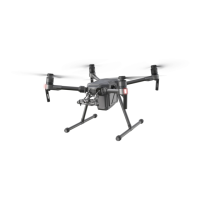3
EN
Safety at a Glance
1. Environmental Considerations
Always y at locations that are clear of building and other obstacles.
DO NOT y above or near large crowds.
Avoid ying at altitudes above 400 feet (120 m)*.
Fly in moderate weather conditions with temperatures between -4° to 113°F (-20° to
45°C).
Please take additional caution while flying indoors because the aircraft stabilization
features may be interfered.
DO NOT y when the wind speed exceeds 12 m/s or 27 mph.
2. Pre-ight Checklist
Ensure the remote controller and aircraft batteries are fully charged.
Ensure the propellers are in good condition and securely tightened before each ight.
Ensure there is nothing obstructing the motors.
Check that the camera lens is clean and free of stains.
Only calibrate the compass when the DJI GO™ 4 app or the status indicator prompt you to do so.
Altering or modifying the aircraft’s parts may impact its stability. Strictly follow DJI’s ofcial instruction to attach compatible
external equipment and please ensure that the overall weight of the aircraft does not exceed 6.14kg after attachment. Be sure
that the external equipment is mounted in the right position as provided in the ofcial instruction to avoid the displacement of the
aircraft’s center of gravity.
3. IP43 Portection Rating
Under stable laboratory conditions, the Matrice 200 Series achieves an IP43 protection rating by IEC60529 standards when
equipped with TB50-M200 or TB55 Intelligent Flight Batteries. However, this protection rating is not permanent and may reduce
over time after long-term use.
DO NOT y when the amount of rainfall exceeds 10 mm/h.
DO NOT fold the frame arms in the rain.
The angle of inclination of the aircraft body and the ground should not exceed ±60° when y the aircraft in rainy days.
Make sure the battery ports, battery compartment ports, battery surfaces, and battery compartment surfaces are dry before
inserting the batteries.
Make sure the battery ports and battery surfaces are free from any liquid before charging the batteries.
Before packing the aircraft into the carrying case, ensure that it is free from any liquid by wiping it carefully.
Product warranty does not cover water damage.
The aircraft does not achieve IP43 protection rating in the following circumstances:
Folded frame arms.
Turn the aircraft upside down.
You use batteries other than the M200 Series' TB50-M200 or TB55 Intelligent Flight Batteries.
The cover for the ports and buttons on the rear of the aircraft are not attached correctly.
The external GPS module is in use.
The weatherproong top shell plug is not rmly attached to the top shell.
The Micro SD card slot cover is not rmly attached.
The aircraft is broken due to various reasons, such as broken aircraft shell, failure of the waterproof adhesive, etc.
4. Operation
Stay away from the rotating propellers and motors.
Maintain visual line of sight of your aircraft at all times.
The function of stopping motor mid-ight by pressing the RTH button while simultaneously pulling the left stick to the bottom
inside corner and holding for 3 seconds is disabled by default. The user should go inside DJI GO 4 app to enable this function.
Only activate this function in an emergency situation.
DO NOT answer incoming calls, texting messages or using any other features of your mobile devices that may distract you from
operating your aircraft in ight. DO NOT y under the inuence of alcohols or drugs.
DO NOT y closely above reective surfaces such as water or snow, as these terrain may affect the performance of the Vision
System.
In the instance of a Low Battery Warning, land the aircraft immediately at a safe location.
During the Return-to-Home procedure, you can adjust the ight altitude to avoid obstacles.
The DJI MATRICE™
200/210/210 RTK aircraft is
NOT a toy and is not suitable
for children under the age of 18.
Note that ‘Safety at a Glance’ only provides
a quick overview of the safety tips. Make
sure you read and understand the remaining
sections of this document.
*The ying altitude restriction varies in different jurisdictions. DO NOT y above the maximum altitudes set forth in your local laws and regulations.

